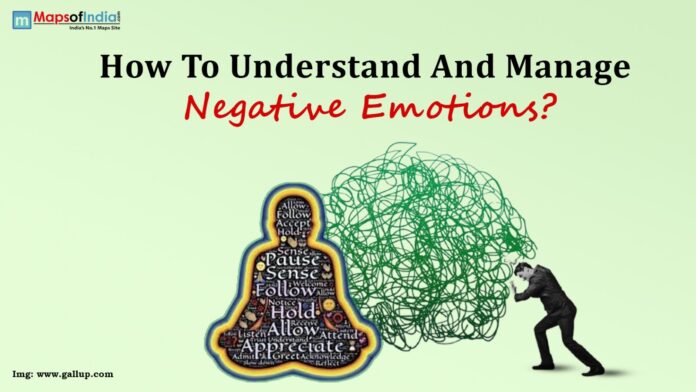Negative emotions are a big part of life. They can appear in all shapes and forms: anger, unhappiness, frustration, or fear. This could be during extreme stress in the work environment, because of personal conflicts, or a sudden change in life. These feelings are understandable and sometimes necessary, but overwhelming feelings can be detrimental to their mental health if not contained. This involves understanding and controlling negative emotions, which are often critical for mental well-being and improved relationship management, resilience, and growth.
Regulate your Negative Emotions Better
-
Recognising and Validating Emotions
It entails the nature of negative emotions, their impact, and strategies for managing them. The initial stage of managing adverse emotions is acceptance. In most cases, people suppress or avoid undesirable feelings, assuming they will just disappear by themselves. When these emotions are not dealt with, they might pile up at times and create stress, anxiety, or irritation. On the contrary, admitting and legitimising such emotions as a response is very healthy and necessary.
For example, if you have a fight and you start to feel angry, you convince yourself that your anger is justified should be justified because it is the typical reaction when someone misunderstands or hurts you. Validating emotions does not mean giving in to them but accepting them as part of your experiences. That is the big door opener to their root causes.
-
Identifying Triggers and Patterns
Understanding what triggers negative emotions can help you glimpse patterns that affect your emotional responses. Your adverse emotions can be triggered by other people, places, circumstances, or inner experiences, such as memories or unresolved conflicts. This insight will help you identify which triggers elicit and awaken your emotional response.
Start a journal of times you feel overwhelmed by negative emotions. Write what is going on, what you think, and what you feel. Patterns will begin to emerge that can help you identify when triggers recur. This is a great empowering step because you can anticipate and prepare for those situations where you know you will feel overwhelmed by negative emotions.
-
Mindfulness Practice
Mindfulness is a very effective tool for dealing with negative emotions because it helps you focus on the present. Try to notice the presence of a negative emotion without judgment, taking cognisance of how it makes you feel inside. Your body might feel tight, and you might start breathing in a rush. This way, you can create an even space between you and the emotion, not acting impulsively.
Regular mindfulness practice will help you build up resilience to negative emotions. Mindfulness techniques, such as deep-breathing exercises, meditation, or grounding exercises, will enable you to stay centred and reduce the intensity of negative feelings. With time, you will respond to challenging situations more comfortably.
-
Reframing Negative Thoughts
Negative emotions spring from negative thought patterns that create situations you may feel are worse than they are. Cognitive reframing is a technique to question and alter those negative thoughts. Therefore, if you are frustrated because you made a mistake at work, you might begin thinking, “I am just terrible at my job.” Reframing could be the shift to “Mistakes are a part of learning, and I can use this experience to improve.”
Reframing can not be reduced to denial of reality or suppression of emotions. Reframing is just a view of the situation from the other angle. This helps minimise negativity from negative emotions and improves the flow of light. Pragmatic application will make you strong in emotional resilience and keep the undesirable thinking of negative thoughts at bay.
-
Building Healthy Outlets
At times, we all need to let out the negatives inside us in a healthy and productive manner. Exercise, dancing, or yoga can be very successful outlets for the pent-up emotions and tension in the body. Creative outlets, like writing, drawing, or playing music, also provide a platform for safe expression.
Engaging in activities that you enjoy genuinely lifts your mood and can provide relief from overwhelming emotions. Channelling negative emotions into positive outlets decreases the chances that you will act impulsively or let the emotions drive your actions. Regular physical or creative activities also promote mental well-being by providing an opportunity to reboot and recharge.
-
Self-Compassion
Negative emotions often make you feel to your own throat, especially when you are responsible for the situation. Self-compassion is dealing with yourself with the kindness and understanding you could offer a friend. It does not judge but accepts that humanly speaking, you are not exempt from negativity, and everybody has tough times.
When you are compassionate toward yourself, it makes it easier to respond to those bad emotions with a balanced view. Self-compassion does the trick by letting go of any feelings of guilt, shame, or even self-criticism so that you may focus on constructive ways of handling your emotions. Remember that self-compassion is not a license to avoid responsibility but to handle yourself as patiently and sympathetically as possible.
-
Venting Your Feelings
Try to bottle up your negative emotions within you, and it might intensify their impact. Good communication helps give you the power to communicate your emotions constructively so that people understand your standpoint better. That is especially crucial in a relationship as unexpressed emotions form the core of reasons for misunderstandings and conflicts.
So, if you have been hurt or disappointed, you can try talking calmly with any concerned party about how you feel about it. This will help clarify things and stop further emotional struggles. Practice using “I” statements such as “I feel upset because…” or “I am hurt because…”; this encourages open dialogue without placing blame. So, clear communication can sometimes reduce misunderstandings and help process emotions healthily.
-
Seeking Professional Help
For others, it might require correct mental healthcare. Therapy or counselling allows you to safely explore emotional feelings, confront deeper issues, and develop coping strategies for emotional pain. A therapist may help you follow techniques suited to your situation and seek ways to process your emotions better.
Seeking professional help is an act of proactive self-care for emotional wellness; it should never be a last resort. Mental health support offers tools for better emotional health and resilience, ranging from chronic stress to unresolved traumas and persistent negative emotions.
-
Building a Support Network
Good support systems can be crucial when dealing with unwanted feelings. When one connects with friends, family, or other support groups, they find comfort, insight, and advice on what to do in certain situations. Sharing your experiences with others can help you feel not alone and remind you that you have many people having the same problems.
Healthy relationships through encouragement and understanding with people are also meaningful. Relieving the emotional burden of negative emotions, trusted persons with whom to share ideas, and perhaps seeing things differently, finding new insights into this problem. Having a supportive community can be very resourceful in dealing with such emotional challenges.
-
Concentrating on Personal Growth
Though not nice, challenging situations may help you grow your character if approached productively. See every testing situation as grounds to acquire knowledge about yourself, your limits, and your strengths. Every time you go through a different emotional state, you can have a chance to grow in terms of emotional intelligence and learn what fuels these emotions.
Negative emotions are merely a natural part of what you could consider to be your life journey. They can help build much-needed resilience and adaptability and better prepare you for the challenges that lie ahead. Negative emotions are a part of life; they don not have to rule your life. It is then that you can turn otherwise bad situations to your advantage. Mindfulness, reframing of negative thinking, and healthy outlets are valuable tools for constructive handling of emotions. Through time and persistent practice, you can acquire an equilibrium in dealing with negative emotions such that your mental health will improve with healthier relationships. Remember, it is one thing to realise that managing life’s emotions is a lifetime process; step by step, you are getting closer to a peaceful, more fulfilling life.




